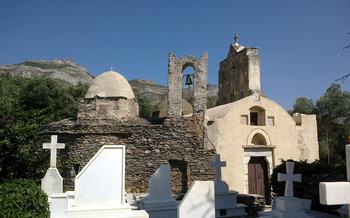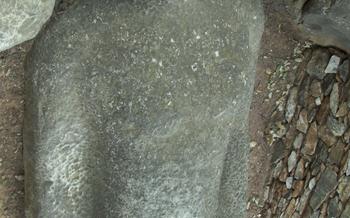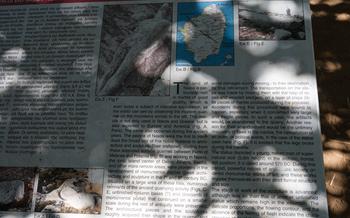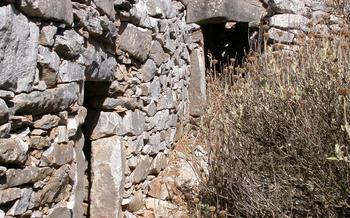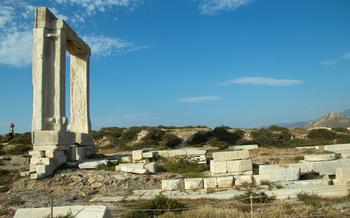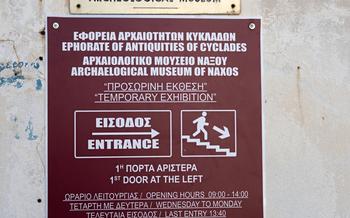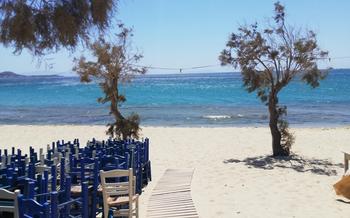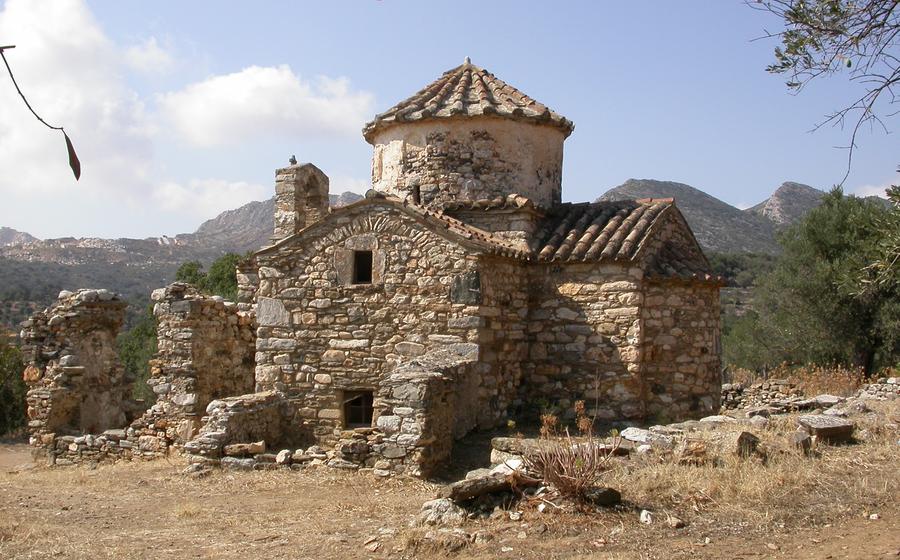
Melanes Pottery Workshops
- Melanes Pottery Workshops: A Journey into Greek Ceramic Art
- Location and Getting There
- Exploring the Workshops
- The Melanes Pottery Technique
- Pottery Classes and Workshops
- Shopping for Melanes Pottery
- Cultural Significance of Melanes Pottery
- Visiting Hours and Contact Information
- Local Festivals and Events
- Melanes Pottery as a Sustainable Practice
- Photography and Social Media
- Combining the Pottery Workshops with Other Activities
- Respecting Local Customs and Traditions
- Insider Tip: Unveiling the Hidden Gems
Melanes Pottery Workshops: A Journey into Greek Ceramic Art
In the heart of the picturesque village of Melanes, nestled amidst rolling hills and olive groves, lies a treasure trove of Greek ceramic art—the Melanes Pottery Workshops. With a history dating back centuries, these workshops have become synonymous with the island of Naxos, preserving and perpetuating the ancient traditions of pottery-making. Each piece handcrafted here is a testament to the skill, dedication, and artistry of the local craftspeople, showcasing the unique Melanes technique that has gained international recognition.
The Melanes Pottery Workshops are not merely a place of production; they are a vibrant hub of cultural exchange and a living testament to the enduring spirit of Greek craftsmanship. Every handcrafted ceramic piece embodies the essence of the island, carrying within it the stories, traditions, and creative genius of the Melanes community. As you explore these workshops, you will not only witness the magic of pottery-making but also gain a deeper appreciation for the cultural heritage of Greece.
Location and Getting There
The Melanes Pottery Workshops are situated in the picturesque village of Melanes, on the northeast coast of Naxos. To reach the workshops, visitors can either rent a car or take a bus from Naxos Town. The exact address of the workshops is Melanes, 843 00, Naxos, Greece.
Upon arrival, visitors will find themselves in a charming and serene setting, surrounded by olive groves and traditional Greek architecture. The workshops are housed in a complex of old stone buildings that have been carefully restored and repurposed for pottery production.
For those driving, there is ample parking space available near the workshops. Visitors taking the bus from Naxos Town should get off at the Melanes bus stop, which is just a short walk from the workshops.
The GPS coordinates for easy navigation are 3147083, 248763
Exploring the Workshops
The Melanes Pottery Workshops are a fascinating complex that offers a glimpse into the ancient art of pottery-making. Visitors are welcome to wander through the workshops, observing the artisans at work and learning about the various stages of the pottery-making process. The complex consists of both indoor and outdoor workspaces, each with its unique purpose.
Inside, visitors can see the potters shaping and molding the clay, using traditional tools and techniques that have been passed down through generations. The outdoor area, on the other hand, is dedicated to firing the pottery in kilns. Visitors can witness the transformation of the clay from a malleable material into a durable and beautiful ceramic object.
Throughout the workshops, visitors can interact with the friendly artisans, who are always happy to share their knowledge and expertise. Whether you're a seasoned pottery enthusiast or simply curious about the craft, the Melanes Pottery Workshops offer a truly immersive and educational experience.
The Melanes Pottery Technique
The pottery created in Melanes is distinguished by its unique characteristics, which set it apart from other Greek ceramic art forms. The artisans of Melanes employ a distinctive technique that has been passed down through generations, ensuring the preservation of traditional methods.
Central to the Melanes pottery technique is the use of locally sourced clay, which imparts a distinct reddish-brown hue to the finished pieces. This clay, combined with the skillful hands of the artisans, results in pottery that is both durable and aesthetically pleasing.
The pottery-making process in Melanes involves several intricate stages. It begins with the preparation of the clay, which is carefully wedged and kneaded to remove any air pockets and achieve a smooth, workable consistency. The clay is then shaped into various forms using a combination of hand-building techniques, including pinching, coiling, and throwing on a potter's wheel.
Once the desired shape is achieved, the pottery is left to dry slowly to prevent cracking. This drying process can take several days, depending on the size and thickness of the piece. After drying, the pottery is fired in a traditional wood-fired kiln, which imparts a unique smoky finish to the surface.
The firing process is crucial in determining the final appearance and durability of the pottery. The artisans carefully control the temperature and duration of the firing, ensuring that the pieces reach the optimal level of hardness and achieve their characteristic reddish-brown color.
Pottery Classes and Workshops
In addition to exploring the workshops and admiring the beautiful pottery, visitors have the opportunity to immerse themselves in the art of ceramics through hands-on pottery classes and workshops. These classes are available for all skill levels, from absolute beginners to experienced potters looking to refine their techniques.
Beginners can start with an introductory class that covers the basics of pottery, including wedging clay, throwing on the wheel, and glazing. More advanced potters can opt for specialized classes that focus on specific techniques, such as raku firing or hand-building.
During a typical pottery class, participants will be guided by experienced instructors who will provide step-by-step instructions and guidance. All necessary materials, including clay, glazes, and tools, will be provided. Classes typically last for a few hours, allowing ample time for participants to create their own unique pieces of pottery.
When choosing a pottery class, it is important to consider your skill level and interests. Beginners may want to start with a basic class to learn the fundamentals, while more experienced potters may prefer to focus on a specific technique or style.
Shopping for Melanes Pottery
The Melanes Pottery Workshops offer a unique opportunity for visitors to purchase authentic and handmade ceramic items directly from the artisans. The workshops showcase a wide variety of ceramic products, including traditional Greek pottery, decorative items, and functional tableware. Each piece is carefully crafted and showcases the skills and creativity of the local potters.
Prices for Melanes pottery vary depending on the size, complexity, and design of the piece. Visitors can expect to pay anywhere from a few euros for a small souvenir to several hundred euros for a large, intricately decorated vase.
When shopping for Melanes pottery, it is important to remember that you are buying a piece of Greek history and culture. The pottery is made using traditional methods and local materials, and each piece is unique. Bargaining is not customary in Greece, but visitors may be able to get a small discount if they purchase multiple items.
Here are some tips for shopping for Melanes pottery:
- Take your time and browse the selection carefully. There are many different pieces to choose from, so you are sure to find something that you love.
- Ask the artisans about the different pieces and their techniques. They are always happy to share their knowledge and passion for pottery.
- If you are unsure about what to buy, ask for recommendations from the artisans or other visitors.
- Be sure to pack your pottery carefully when you travel home. Ceramic items can be fragile, so it is important to protect them from damage.
Cultural Significance of Melanes Pottery
Pottery holds a profound cultural significance in Greece, serving as a tangible link to the nation's rich history and traditions. Melanes pottery, in particular, embodies the essence of Greek ceramic art, showcasing intricate designs and motifs that carry deep symbolic meaning. The pottery often features traditional patterns and motifs inspired by nature, such as flowers, leaves, and marine life, reflecting the close connection between the local artisans and their surroundings. Additionally, the pottery may incorporate ancient Greek symbols and iconography, paying homage to the region's rich cultural heritage. Each piece of Melanes pottery is a unique work of art that tells a story, capturing the essence of Greek culture and identity.
The workshops themselves serve as a repository of traditional knowledge and skills, passed down through generations of potters. The artisans at Melanes are passionate about preserving and promoting this cultural heritage, ensuring that the techniques and designs are not lost to time. They actively participate in cultural events and demonstrations, showcasing their craft and educating the public about its significance. By visiting the Melanes Pottery Workshops, visitors not only gain an appreciation for the beauty and craftsmanship of Greek pottery but also contribute to the preservation of a cherished cultural tradition.
Visiting Hours and Contact Information
The Melanes Pottery Workshops welcome visitors throughout the year, offering a glimpse into the fascinating world of Greek ceramic art. The workshops are typically open from Monday to Friday, from 9am to 5pm. However, it is advisable to check in advance for any seasonal variations or special closures.
For inquiries and bookings, visitors can reach out to the workshops via email or telephone. The contact details can be found on the official website or by searching online. It is recommended to make reservations, especially during the peak tourist season, to avoid disappointment and ensure a personalized experience.
To make the most of your visit, plan to arrive during the morning hours when the artisans are actively engaged in their craft. This will allow you to witness the pottery-making process firsthand and interact with the skilled craftsmen.
During the summer months, the workshops can get quite crowded, especially in the afternoon. If you prefer a quieter and more intimate experience, consider visiting during the off-season or on a weekday. This will give you the opportunity to delve deeper into the art form and engage in meaningful conversations with the artisans.
Local Festivals and Events
Melanes, renowned for its vibrant pottery tradition, hosts a series of captivating festivals and events throughout the year that celebrate the art of ceramics and the rich cultural heritage of the region. These events offer visitors an immersive experience, allowing them to witness the skills and creativity of local artisans firsthand.
One of the highlights is the Melanes Pottery Festival, held annually in August. This lively festival showcases the finest works of local potters, featuring exhibitions, demonstrations, and competitions. Visitors can marvel at the intricate designs and techniques employed by the artisans, and even try their hand at pottery-making workshops.
Another notable event is the Naxos Pottery Symposium, which takes place in September. This international gathering brings together potters from around the world to share their knowledge and skills. Participants engage in workshops, discussions, and exhibitions, creating a vibrant exchange of ideas and techniques.
These festivals provide an excellent opportunity for visitors to immerse themselves in the local culture and traditions while witnessing the exceptional artistry of Melanes potters.
Melanes Pottery as a Sustainable Practice
The Melanes Pottery Workshops embrace sustainability as a guiding principle, minimizing their environmental impact through eco-friendly materials and practices. The clay used in their pottery is locally sourced, reducing carbon emissions associated with transportation. Moreover, the pottery-making process generates minimal waste, as any leftover clay is recycled and reused. This circular economy approach conserves resources and contributes to the overall sustainability of the workshops.
In addition, the workshops actively work to reduce their carbon footprint by employing energy-efficient lighting and kilns. They prioritize natural ventilation to minimize the need for air conditioning, further lowering their energy consumption. By embracing sustainable practices, the Melanes Pottery Workshops set an example for the pottery industry, demonstrating that preserving traditional crafts can go hand in hand with environmental responsibility.
Photography and Social Media
Capturing the essence of the Melanes Pottery Workshops through photography is a fantastic way to preserve memories and share the experience with others. While documenting your visit, it's important to be mindful of the artisans' privacy and the overall ambiance of the workshops.
Guidelines for Photography and Videography:
-
Respect the Artisans: Avoid taking photos or videos of the artisans without their consent. Be polite and ask for permission before capturing their images.
-
No Flash Photography: Flash photography can be disruptive to the artisans' work and can damage the delicate pottery. Turn off your flash when taking photos indoors.
-
Capture the Process: Focus on capturing the pottery-making process, from the initial shaping of the clay to the intricate painting and glazing techniques.
-
Composition and Lighting: Pay attention to composition and lighting to create visually appealing shots. Natural light often provides the best illumination for pottery photography.
Sharing on Social Media:
-
Tag and Credit: When sharing your photos or videos on social media, be sure to tag the Melanes Pottery Workshops and credit the artisans whose work you feature.
-
Use Hashtags: Use relevant hashtags such as #MelanesPottery, #NaxosPottery, or #GreekCeramics to increase the visibility of your posts.
-
Share Your Experience: Accompany your photos with a brief description of your visit, highlighting what you learned and what makes the Melanes Pottery Workshops unique.
-
Engage with the Community: Respond to comments and questions on your posts, and engage with other pottery enthusiasts and travelers who share your passion for ceramics.
Combining the Pottery Workshops with Other Activities
To make the most of your trip to Melanes, consider exploring the neighboring attractions that complement the pottery workshops. A short walk from the workshops, you'll find the Melanes Beach, a picturesque stretch of golden sand and crystal-clear waters, ideal for swimming, sunbathing, and enjoying water sports.
For a taste of local history and culture, visit the Melanes Folklore Museum, which houses a collection of traditional costumes, tools, and artifacts that provide a glimpse into the village's rich past. The museum also organizes cultural events and workshops throughout the year.
If you're an outdoor enthusiast, embark on a scenic hike through the Melanes Valley, where you'll encounter lush greenery, cascading waterfalls, and breathtaking views of the surrounding mountains. The valley is home to several hiking trails, ranging from easy to challenging, offering options for all fitness levels.
For a unique culinary experience, indulge in a traditional Greek meal at one of the tavernas in Melanes. Sample local delicacies such as fresh seafood, grilled meats, and homemade desserts, accompanied by the warm hospitality of the locals.
Consider creating a well-rounded travel itinerary that incorporates visits to the pottery workshops, Melanes Beach, the Folklore Museum, and the Melanes Valley. By combining these diverse experiences, you'll gain a deeper appreciation for the cultural heritage, natural beauty, and culinary delights of Melanes.
Respecting Local Customs and Traditions
When visiting the Melanes Pottery Workshops, it's essential to be respectful of local customs and traditions. Dress modestly and avoid wearing revealing clothing. Within the workshops, maintain a quiet and respectful demeanor as the artisans are deeply focused on their craft. Remember that haggling is not customary in Greece, so accept the prices offered by the artisans or politely decline if an item is out of your budget. Support the local economy by purchasing pottery directly from the workshops rather than from souvenir shops. Finally, interact with the locals with warmth and respect, as they are proud of their heritage and eager to share their culture with visitors.
Insider Tip: Unveiling the Hidden Gems
Beyond the main pottery workshops, there are hidden gems waiting to be discovered by curious travelers. One secret spot is a small, secluded kiln tucked away behind the main building. Here, visitors can witness the ancient art of firing pottery in a traditional wood-burning kiln. The atmosphere is magical as the flames dance and the clay transforms into beautiful ceramic pieces.
For those seeking a deeper understanding of the Melanes pottery technique, there are opportunities to learn from the masters themselves. Visitors can arrange for private lessons with experienced artisans who share their knowledge and skills. These sessions offer a unique chance to create your own pottery piece under the guidance of an expert, taking home a personalized souvenir and a lasting memory of your time in Melanes.
Moreover, exploring the surrounding countryside reveals breathtaking views and hidden treasures. A short walk from the workshops leads to a charming olive grove, where visitors can relax under the shade of ancient trees and enjoy panoramic vistas of the valley. The paths winding through the grove offer opportunities for leisurely strolls, taking in the beauty of the natural surroundings and discovering hidden corners that showcase the authentic essence of Melanes.

